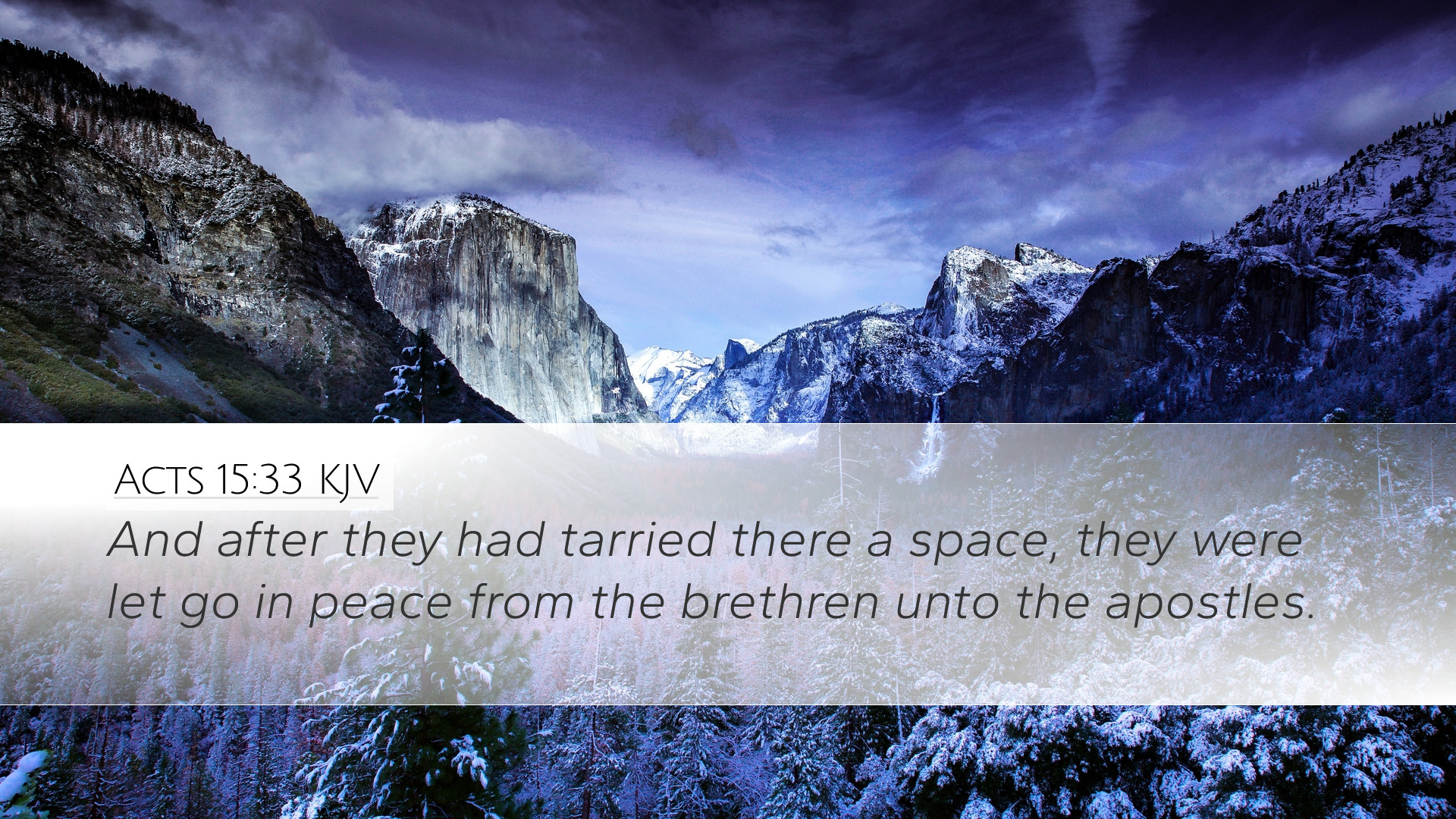Commentary on Acts 15:33
Verse Context: Acts 15:33 states, “And after they had tarried there a space, they were let go in peace from the brethren unto the apostles.” This verse marks a significant moment in the early church, revealing both the communal nature of Christian fellowship and the resolutions achieved at the Council of Jerusalem.
Historical Context
The verse appears within the framework of the early Church’s struggles regarding the Gentile converts’ relation to the Mosaic Law. The Council of Jerusalem was convened to address critical theological disputes and to establish a unified approach to Gentile inclusion in the Christian community. Understanding this context is essential for grasping the implications of the decisions made and their aftermath.
Insights from Matthew Henry
Matthew Henry emphasizes the poignant organic connection between the apostles and the church at Antioch. He notes that after delivering the decrees set forth by the Council, the apostles were not only engaged in their mission but also enjoyed the fellowship and cooperation of the congregation.
- Communal Relations: Henry points out that their departure “in peace” indicates a harmonious relationship within the early church, highlighting that the spirit of unity prevailed despite earlier conflicts.
- Peace as a Testimony: He underscores that peace between brethren is not merely a personal tranquility but serves as a witness to the faithful operation of God within the community.
Insights from Albert Barnes
Albert Barnes offers a detailed exploration of the phrase “let go in peace,” suggesting that it signifies not just a physical departure but also a theological affirmation of God's grace and guidance amidst the church's collective endeavors.
- Church Governance: Barnes highlights the importance of collective decision-making in the church, suggesting that the peace with which they left represents the acceptance of the council's authority and decisions by the church as a whole.
- Impact on Spiritual Authority: The resolution fostered spiritual authority that could guide both local churches and future councils in doctrinal matters. This illustrates the New Testament model of authority being rooted in consensus and the Holy Spirit's leading.
Insights from Adam Clarke
Adam Clarke provides an exegetical approach that highlights the lasting implications of the council's decision and the subsequent actions of the apostles. He underscores the theological significance of ensuring that both Jewish and Gentile Christians could coexist in fellowship.
- Emphasis on Unity: Clarke notes that the agreement not only emphasized doctrinal purity but also the practical implications of living out the faith in a diverse community.
- Historical Significance: The peace established leads Clarke to discuss how it set a precedent for future councils; thus, the nature of church governance and decision-making was firmly grounded in mutual respect and harmony among diverse believers.
Theological Reflections
Acts 15:33 serves as an essential theological reflection on peace and unity within the body of Christ. The importance of dialogue, communal decisions, and the resolve to remain in fellowship amid doctrinal disagreements tells us much about the nature of the church.
- Importance of Divine Guidance: The peaceful resolution suggests an understanding that the Holy Spirit guides the church through collective discernment.
- Role of Unity in Witness: The church’s ability to navigate tensions enhances its witness to the surrounding culture; peace is indeed a powerful testimony of God’s work through His people.
- Diversity within Unity: The presence of diverse practices and backgrounds within the Christian faith underscores the importance of the gospel transcending cultural boundaries, allowing for varied expressions of faith and practice.
Practical Application
For pastors, students, and theologians, the message conveyed through Acts 15:33 encourages an examination of how they foster peace and unity within their communities. Notably, this can include:
- Promoting Dialogue: Engaging in open conversations on contentious issues while actively seeking harmony should remain a priority.
- Upholding Consensus Building: Recognizing the weight of collective decision-making aids in validating the shared experiences of church members.
- Modeling God’s Spirit of Peace: Living in a manner that reflects the communal peace experienced in the early church, fostering environments where grace, forgiveness, and mutual respect thrive.
Conclusion
Acts 15:33, though a brief verse, encapsulates profound truths about the communal nature of the early Church, the importance of collective decision-making, and the resulting peace that stems from unity in the body of Christ. The insights provided by Matthew Henry, Albert Barnes, and Adam Clarke lay a rich foundation for understanding how these themes resonate with contemporary faith communities.


